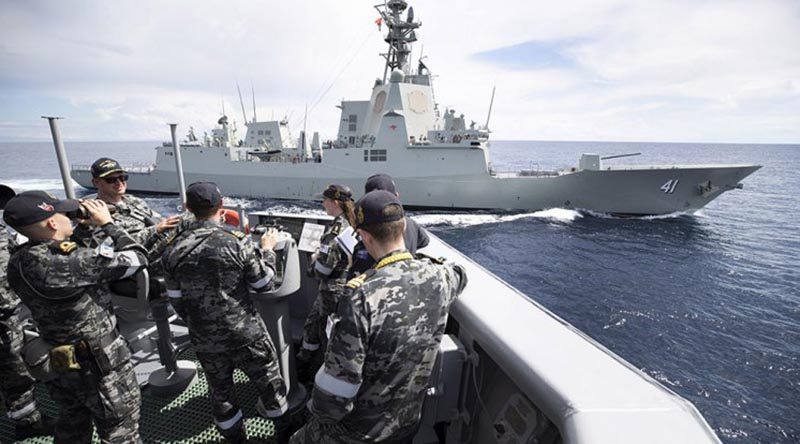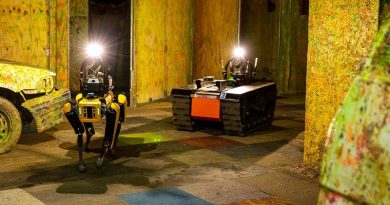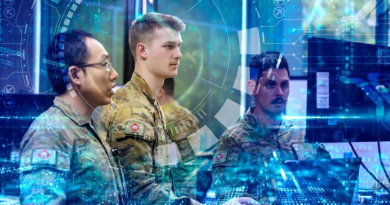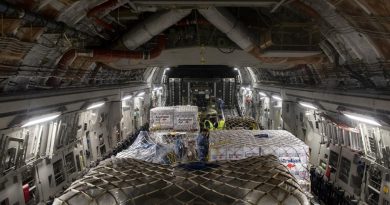Navy trialling new camouflage uniforms

The Royal Australian Navy is currently testing a new camouflaged uniform just 10 years after going to cams instead of grey overalls – and three years after DPNU was scheduled to be replaced.
CAPTION: HMAS Melbourne’s crew trial the prototype Maritime Multi-cam Pattern Uniform at sea, in company with HMAS Brisbane. Photo by Leading Seaman Kieran Dempsey.
Under evaluation since 2015 and initially scheduled to be issued in late 2017, the new look multi-cam uniform is currently undergoing fleet-wide sea trials.
The trial of the current fabric will end in July, with trials of more fabrics scheduled to follow.
Cut, design and pattern of the prototype Maritime Multi-cam Pattern Uniform (MMPU) is based on the Australian Multi-cam Combat Uniform used by the Australian Army and Air Force.
MMPU, in a unique six-colour palette, will incorporate changes to the fabric, print pattern and uniform design.
Laboratory-tested, MMPU sea-going variant fabric is required to be flame resistant, while being lighter than the Disruptive Pattern Navy Uniform (DPNU) – theoretically allowing it to be more comfortable in warmer climates.
Director Navy Logistics Support Captain Catherine Rhodes said trial participants were assessing the comfort and durability of the new rig.
“We will use the information they give us to eventually produce a maritime uniform that best meets Navy’s requirements,” Captain Rhodes said.
The trial has seen the MMPUs issued to members on a wide range of different Navy platforms, including one major fleet unit, three patrol boats and two submarines.
“There are always going to be issues – that’s what a trial is for,” Captain Rhodes said.
“We need to meet our people’s needs and expectations while ensuring our uniform is fit for purpose.
“It’s a long process to get things right, that’s why the feedback from our trial participants is so important and will be fed into subsequent trial garments over the coming years.”
The manufacture of the MMPU fabric and garments is being carried out in Australia.
The fabric is produced by Bruck Pty Ltd, while the garments are manufactured by Australian Defence Apparel.
.
.
.
.
.
.

.
.






Good… still with the reflective strips… guess it makes it easier for strafing! I hated them then… and still hate them!!!
If it’s functional, comfortable, easy to maintain, and it works for both men & women – then it’s a winner.
The current DPNU looks a lot better than the combat coveralls did – and it’s more flexible. This will improve on that.
The material being trialled is only flame resistant it has not been tested for missile or arc flash from High voltage electrical equipment as used in the LHDs.
The ploy cotton overalls and No 8s the RN used prior to the Falklands war was only flame resistant too.It had a tendency to melt on skin , the heat from a missile flash would increase the material above its flash point and even after the flash had passed the heat in the clothing would catch fire and continue to burn increasing the size and area and depth of burns to the casualties skin.
The poly cotton was chosen because it was easier to dry and iron, and was cooler to wear.
So here we are 39 years later and a new generation have not heeded the lessons learned in war.
Material such as Tencel is tested for an arc flash and is flame retarding. It’s tested to the NFPA standards with an Arc treated thermal protection value. It’s cool and comfortable to wear.
category 2 arc flash clothing will protect against 8 to 12 calories per sq cm. An analogy of 1 calorie per sq cm is the same as holding a lit cigarette on your skin for 1 second.
tencel has Proban chemical impregnated in the cotton weave fibres, in an arc flash it releases an inert gas that will extinguish the flame before it burns the skin.
The hi vis stripe, stuffed the whole “camo” thing up though didn’t it
It does not really matter whether they wear cam’s or not as long as China is happy to make the new gear, who cares?
Sounds a bit like the old army snake charmers are at it again as well as the “green eyed monster”. You army blokes of today have no idea what it used to be like when our ships were in the tropics, No 8’s hot as bloody hell especially in summer. If there are still any Army former Vietnam Veterans who got a free sea voyage to Vung Tau, ask them what conditions were like on the wonderful Vung Tau Ferry as the old girl HMAS Sydney 111 was known as as we got into tropical waters. As a previous comment was made, at least the RAN’s cams are respectable not like the RAAF’s blue P.J.’s.
Doesn’t matter what they wear. Still won’t be as bad as the “street fighter” RAAF cam
? Damn skippy…. that shit is what I’d wear on a holiday in Ibiza!
They stand out more on the ships now than they did wearing grey with a grey ship as a back drop.
I think it was a jealousy thing, just like the RAAF with their blue jarmies.
Mate, thier cams work, there was a ship a couple of clicks offshore and I could not see one of the Engineers on board.
Nothing says camouflage like 3M Reflective tape.
well, at least even the Navy is trying to do it right … unlike the RAAF with their ‘stands out like dogs balls’ Street Fighter pyjamas …
Excellent, the ‘other side’ will be completely baffled seeing all these apparently crewless Australian ships sailing around. I’m at something of a loss understanding why Navy needs cam gear. I don’t really care if they get it but WHY?????? Please don’t cite boarding party’s etc because it wouldn’t matter if they wore fluro pink. Now there’s an idea!!!!
It’s not meant to be or used as camouflage. All it’s doing is aligning Navy’s uniform with Army & Airforce, purely for uniformity in this case, militaries “One in all in” policy. The reasoning was the same with the change from the Grey combat coveralls to DPNU’s.
It’s not meant to be or used as camouflage. All it’s doing is aligning Navy’s uniform with Army & Airforce, purely for uniformity in this case, militaries “One in all in” policy. The reasoning was the same with the change from the Grey combat coveralls to DPNU’s.